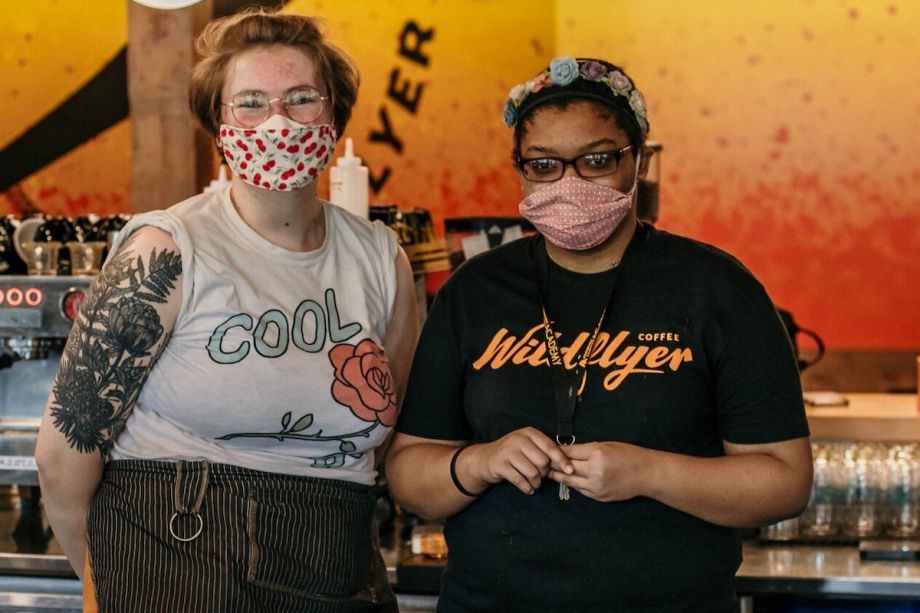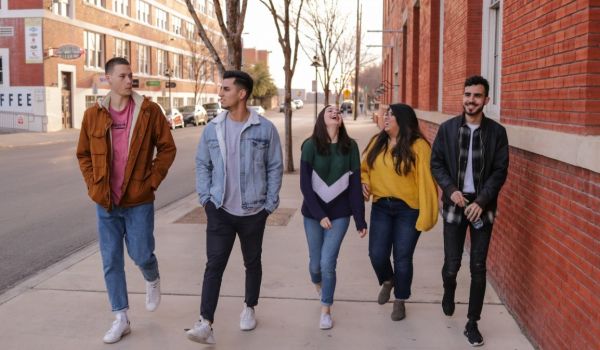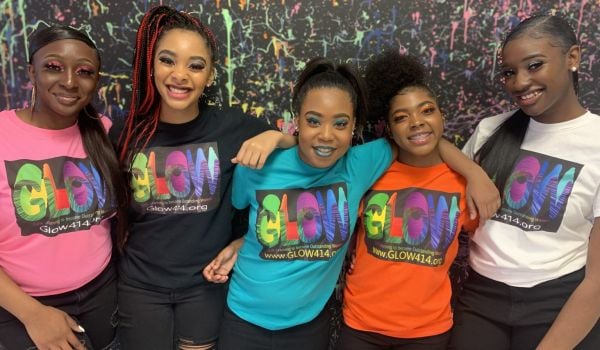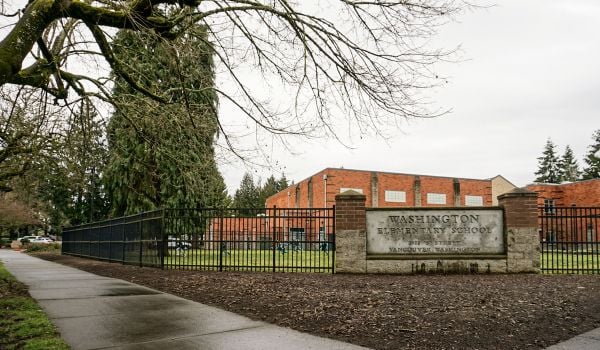This article is co-published with The Imprint, a national nonprofit news outlet covering child welfare and youth justice.
On a recent Monday morning, patrons at Wildflyer Coffee in south Minneapolis hunched over laptops, sipping from steaming cups of chai, cortados and sage caramel lattes. Sunlight streamed in through windows adorned with potted plants at the corner of Minnehaha Avenue and East 33rd Street.
There’s an art studio and small local theater nearby, in a neighborhood dotted with signs urging people to keep their “neighbors in tents” safe. The coffee shop’s branded merchandise — T-shirts, mugs and sweatshirts — remind customers where their dollars go at this unique establishment: “End youth homelessness,” the goods declare.
And behind the counter at Wildflyer are baristas who know all too well the urgency of the mission.
Among them is a 22-year-old whose life changed suddenly when he was 14, after a fire destroyed his childhood home. The Imprint is not naming him to protect his privacy.
“I had an amazing childhood,” he said in an interview during a break from work. “Then in a seven-day span, I lost my home, my parents got a divorce and my dad quit working.”
Things spiraled from there: Life in and out of hotels, parental drug use, arguments, a criminal charge at age 17 and a brief stint in jail.
But at Wildflyer — where serving Boss Blend, Ethiopia Nansebo and Ice Queen Cold Brew blends is as important as accessing a career counselor and learning to open a bank account — there was a lifeline.
“They truly care more about you and your success as a young individual than your work output,” he said.
‘A piece of the puzzle’
Wildflyer Coffee opened in 2017 to help youth experiencing homelessness develop professional skills and maintain stable employment.. A dozen young people ages 16 to 24 rotate through the work training program every four months. Fifty percent of the nonprofit program’s revenue comes from sales and 50% from donations. A second location operates in St. Paul.
Hard-skills training focuses on working the register and steaming milk. But the program also teaches interviewing, resume-building and communication skills for the workplace. Youth are asked to work 20 hours a week at an hourly rate of $15 plus tips. In return, they have access to financial wellness and mental health support provided by program managers who help coordinate housing, basic needs and counseling sessions. A “latte art” workshop and networking event cap off the program. “Our focus is on employability and long-term job retention,” said Carley Kammerer, the co-founder and executive director of Wildflyer Coffee, who is a licensed social worker with a background in working with youth experiencing homelessness.
ut the first month is simply about “building rapport,” added Kenzie Diessner, Wildflyer’s program manager. Diessner, who is also a licensed social worker, met Kammerer when the two worked together at a local youth housing program and shelter.
“Flexible accountability is what we call it,” she continued. “We don’t reprimand for any no-calls or no-shows, but we do talk to you and ask you about things that are happening outside of work.”
“We really see Wildflyer as a piece of the puzzle,” Diessner said. “Yes, our slogan is to end youth homelessness but we really see ourselves as like a piece of the full mosaic to ending it. Homelessness is complex and requires layers of partnerships around housing, healthcare, and employment to end it.”
Employment programs meeting the need
According to studies of Minnesota’s homeless population, every year an estimated 13,300 children and youth 24 and younger experience homelessness on their own. The figure includes as many as 5,800 minors 17 and younger, and 7,500 youth ages 18 and older who sleep on couches, in cars and on public transit.
Among these homeless young people, Black and Native Americans are overrepresented compared to their percentage of the general population. And 23% identify as lesbian, gay, bisexual, transgender, queer or questioning, the Wilder Research firm found.
They are also vibrant young people who have become ambassadors for the Wildflyer program, featured on the coffee shop’s website. Lala reports getting a job working at a day care center after receiving her training. Another recent participant, Venus, reported landing a job at a coffee bar at a hotel, and teaching art to kids in shelters.
There is still some help available even when the program formally ends, Kammerer said. Some participants stop by every week to check in with adults who have provided key support.
“Whether it’s to chat or grab some hygiene supplies,” she said, “we want to provide them with whatever they need, even if they’re not being paid by us anymore.”
Similar training and support exists at coffee shops in California and Texas, home to La La Land Kind Cafes, which operate on a similar model but specifically serve foster youth. The eight-week internship programs at La La Land are tailored to the needs of young people who have spent years with housing instability in the child welfare system, and who may be recovering from trauma.
“We’ll be the employers who are patient enough to help people with very complicated and traumatic pasts be very successful in the employment world,” Abigail Myers, a clinical psychologist who developed and oversees La La Land’s internship program said in 2021.
The young barista in Minneapolis interviewed by The Imprint, wearing a sweatshirt and bright orange shorts, said he is two months into his employment program, and already, the future “feels a lot brighter. My systems of waking up early and educating myself are improving.”
He’s even looking ahead to future prospects.
“I believe I will grow a successful company within three to five years,” he added. “And I’m excited.”
Alex Perez is a Minnesota-based reporter covering child welfare. He is a graduate of Northwestern University’s Medill School of Journalism, with a master’s degree in investigative journalism. He received a bachelor’s degree in broadcast journalism from North Central College.

















Add to the Discussion
Next City sustaining members can comment on our stories. Keep the discussion going! Join our community of engaged members by donating today.
Already a sustaining member? Login here.